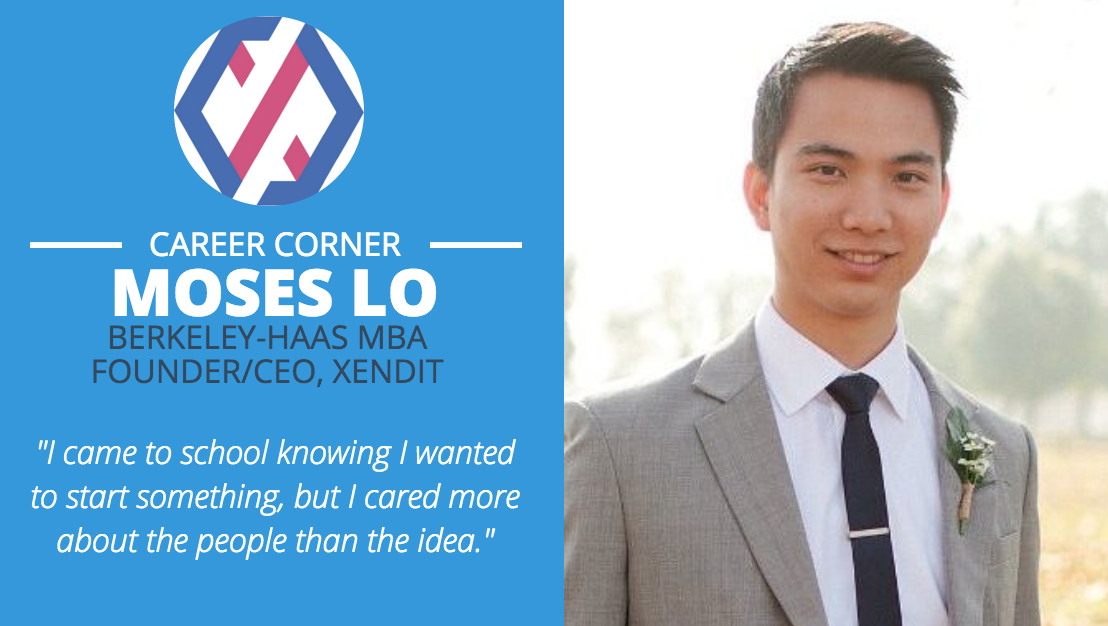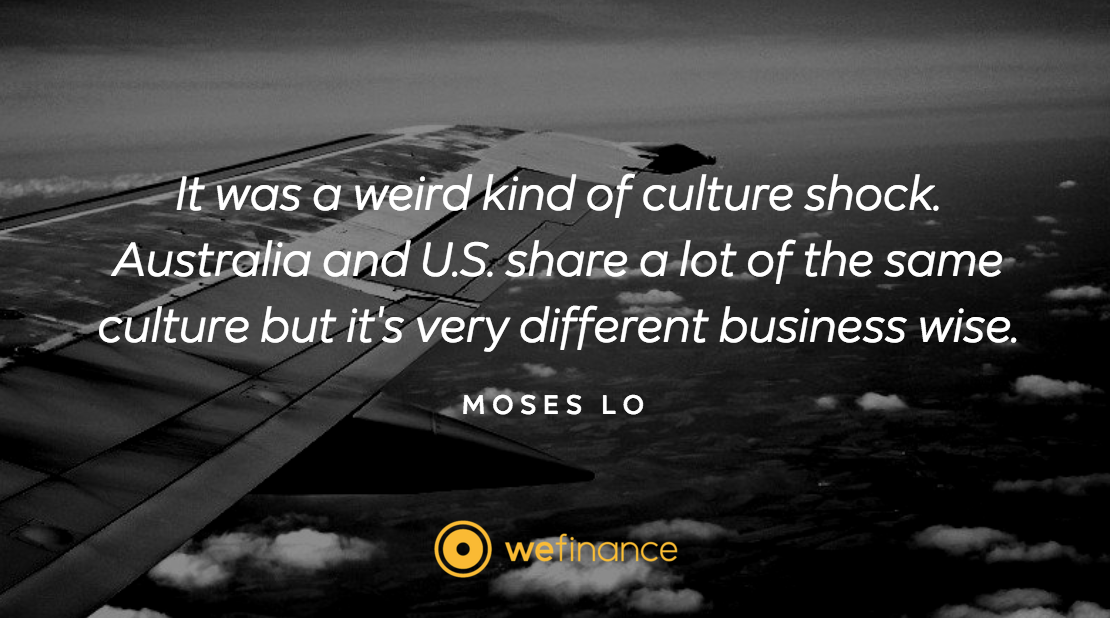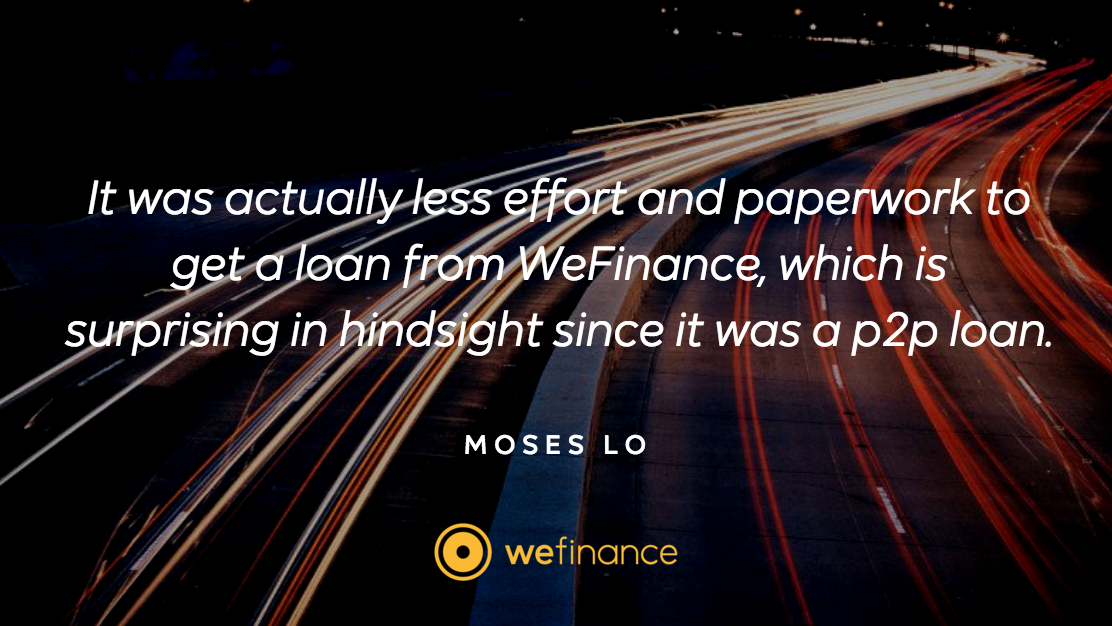Founder Corner with Moses Lo

Moses Lo is a Haas MBA and Founder and CEO of Xendit (YC S15). He crowdfunded a loan to refinance his student debt with WeFinance. We got to catch up with Moses to discuss starting a company at Haas, adapting to the U.S. as an international student, and how he looks at financial products.
Career Corner with WeFinance is a regular series that looks at alumni, their experiences, and what they’ve learned.
Are you a founder that’s going “up and to the right” and can pitch anything? WeFinance for Founders is the fastest way to crowdfund a personal loan.
What’s Xendit?
Xendit is a mobile payments company in Indonesia. Our goal is to replace cash as the default payments method in South East Asia. The closest analogy in the U.S. is Venmo, but we think the opportunity with South East Asia is bigger.
Why? Mobile adoption is amazing. There’s a huge population of people under 30 and there’s this whole generation of people who are mobile first — people who don’t use desktops or laptops, just phones. It’s a huge opportunity to build something big.
As the economy develops, this mobile first, millennial, population are going to be the people making everything happening. Smartphone penetration is 20% and growing 20% year-over-year — that’s extremely fast.
Our vision is making payments convenient.
What was your motivation for starting Xendit?
I’ve had this weird issue with banks my whole life. I feel like banking in its current form sucks. It’s just financial services made for the previous generation, by the previous generation.
Consider that money is just data that’s flowing; it’s just numbers on a ledger. Given this, it’s amazing how difficult, nontransparent, and hard it is to move money in the current system.
Looking at opportunities, I don’t think we can change the whole financial system, but I think we can make a meaningful impact in a little part, like how money moves. At the end of the day, how money moves is what’s impactful for individuals, and that’s our core motivation.
You could say I have a love—hate relationship with financial services. I hate how things work right now, but I love trying to build something that can actually make a difference.
Did you have the idea before Haas?
Yes, but I have lots of ideas at any one time — I always maintain a list.
I came to school knowing I wanted to start something, but I cared more about the people than the idea. Once I found people, we sat down and looked at what skills we had around the table and where we had a good shot of doing something impactful.
Any particular resources at Haas that are helpful to prospective founders?
I ran LAUNCH which was the startup competition. I found this really useful as an international to get the lay of the land. I came here knowing zero people, zero VCs, and zero startups — this helped me build my network within Berkeley.
We’re also working out of SkyDeck which is an amazing community and resource!

Having worked in Australia and San Francisco, was it hard to adapt culturally?
It was a weird kind of culture shock. Australia and U.S. share a lot of the same culture — democracy, free market capitalism, and even pop culture — from a principle level. Once you arrive, it’s very different, especially business wise.
One example you have to learn to do in the U.S. is to boast about yourself; self-advertising and self-promotion are common parts of business.
In contrast, boasting yourself is seen as super rude in Australia; self-deprecating is more common.
What tips would you give to international students thinking about doing an MBA in the U.S.?
Three tips:
1) Understand how the U.S. works and adapt quickly. Don’t fight it.
2) Money is amazingly difficult. Whether you’re moving money into the U.S., trying to open a bank account, or trying to get a loan, it’s going to be a pain as an international.
3) Understanding networking and what that means. Networking to us in Australia is a dirty word, while here it’s a standard course of business. Things are especially hard if you’re an introvert in a culture that rewards extraversion — that was difficult for me to get around.
Do you think there are any mistakes international students make with finances? Like not trying to establish credit right away?
I feel like there’s this weird formula you need to follow — get an account, then some sort of credit card (even if you’re just going to pay everything off immediately) just to build your credit score.
Also, if you’re trying to do student loans, you should apply for it while you’re still in school, otherwise it gets really hard.
So ranking these things: opening a bank account was kind of hard, establishing a credit score afterwards was really hard, and a loan was impossible.
What were you doing before attending Haas?
I was at the Boston Consulting Group (BCG) doing management consulting. I was a generalist and covered various sectors that reflected the Australian economy — mining, healthcare, media, banking, government — but my function focused around technology.
One really cool project I worked on was in mining. When you think of mining, you think of people in hard hats blowing things up, putting it in a truck, and sending it to China. We then started changing it to robots doing the mining, with people controlling the robots thousands of km away. Now it’s autonomous; it’s a big mine with two people overseeing it, and these huge transformer-sized robots doing their own thing.
I’ve noticed a lot of management consultants who have moved on to become founders. Do you think working as a consultant is good founder training?
Yes and no.
What management consulting can never teach you is how to execute. There’s a lot of planning around what to do and how to do it, but you don’t actually get to execute.
It does teach you how to think, which is super valuable. You learn how to think like a C-level executive.
You also learn that nothing is impossible. Being a consultant makes me believe that someone with a lot of work ethic can tackle any industry.

What was your experience with WeFinance? How did it compare with other services you’ve used in the past?
Getting a loan: I was able to get a loan using WeFinance, so it was 10x better on that criteria alone. I tried every other loan facility, from traditional banks to p2p lending, and I wasn’t able to get a loan from them.
Ease: It was actually less effort to get a loan from WeFinance, which is kind of surprising in hindsight since it was a p2p loan. The WeFinance loan took less effort and had less paperwork, which was great. Once I could estimate the end result, it was definitely a higher “effort to return” ratio.
The one dimension that didn’t help was that it ended up being a smaller amount than I needed, but it was due to the nature of my network being international.
What do you look for when you consider financial products?
Price and ease of use.
1) My top priority is a good financial return; in this case, a lower interest rate.
2) Ease of use. Maybe I’m a millennial in this sense, but something that’s easy to use, easy to understand, and does stuff for you. One thing I love is how my payments are automated. I can look at my bank account and see the monthly payments for my WeFinance loan happen. I don’t have to think about it — I love that.
Do you see yourself lending on the platform in the future? Only to your network? To Haas students? Friends of friends?
Definitely. I think there’s this reciprocity principle that comes into play. I feel there’s karma associated with helping people who gave me a loan, where I now want to give back to that community. I would give back here before at other places.
I definitely see myself lending to Haas students — who, I feel, have a low perceived risk — after I pay back my current loans.
Do you think other international students would benefit from crowdfunding a loan on WeFinance?
One thing I didn’t realize at first is that you have to push this within your network in the U.S. only. I had lots of friends internationally who wanted to help but I couldn’t take that yet.
I definitely think an international student should use WeFinance. It works and it’s typically cheaper than a loan they would get from somewhere else.